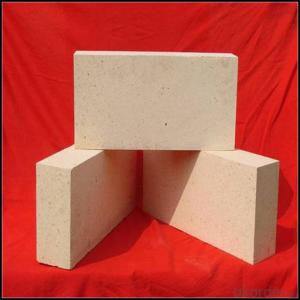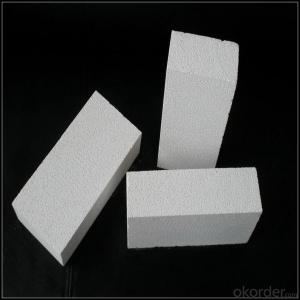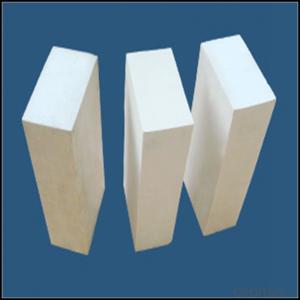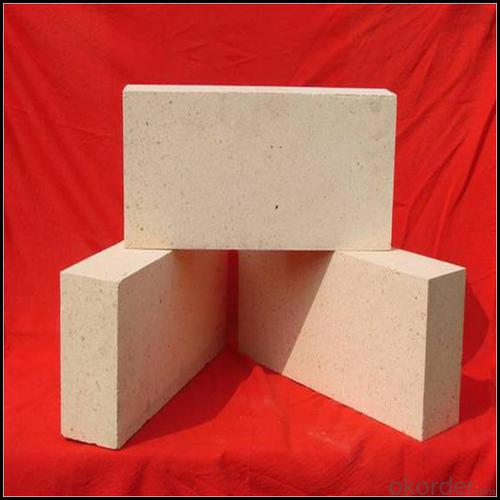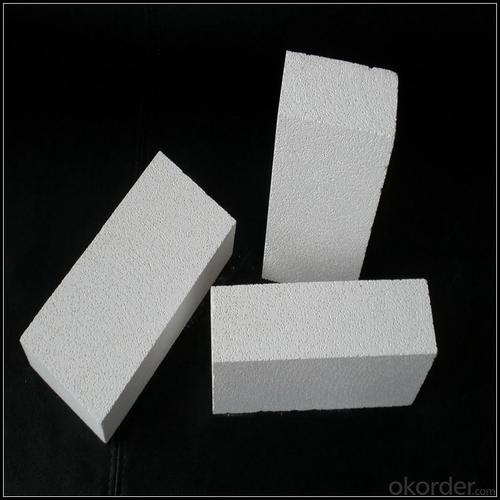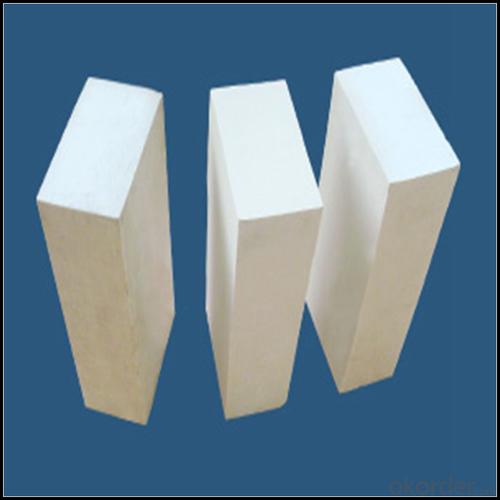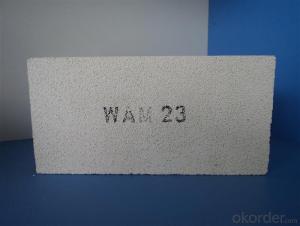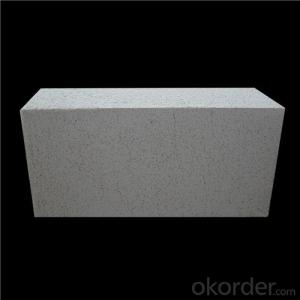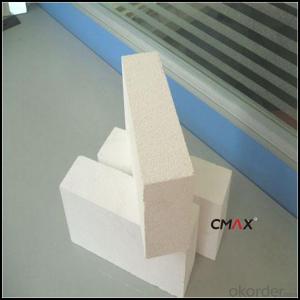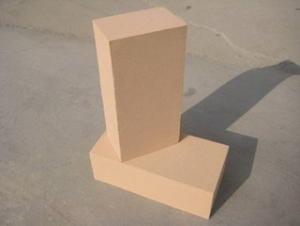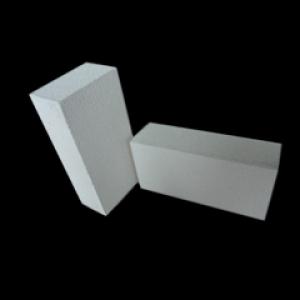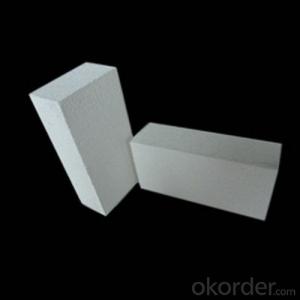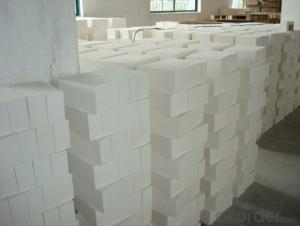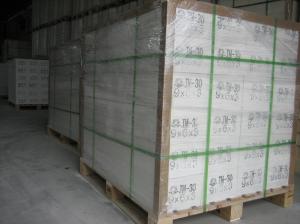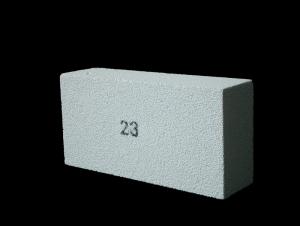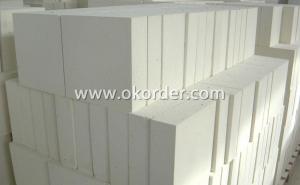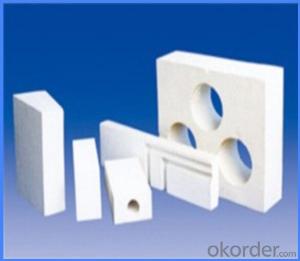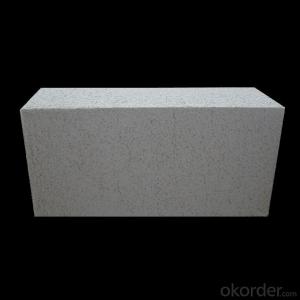Standard Size Insulating Fire Bricks
- Loading Port:
- China main port
- Payment Terms:
- TT OR LC
- Min Order Qty:
- 0.01
- Supply Capability:
- 1800 m.t/month
OKorder Service Pledge
OKorder Financial Service
You Might Also Like
Refractory Brick
CMAX firebricks are classified under temperature between 1300℃ to 1700℃, manufactured from high purity alumina clay by mixing, press-forming, drying, sintering and machining. Bricks contain carefully-graded organic fillers which are burned out during sintering to give a uniform controllable pore structure. This technique makes product feature low thermal conductivity and excellent heat insulation
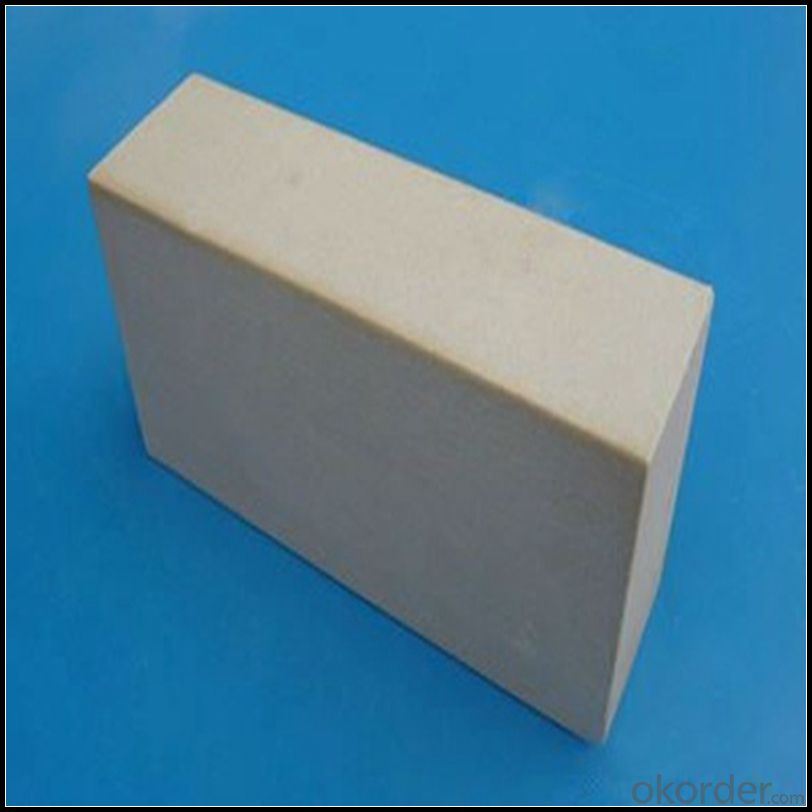
Features
1.low porosity
2.high compressive strength.
3.all size you need
4.best price with high quality
5.long using time
Application
1.Building material industry,kiln,heating equipment and the inwall of high—temperature pipe line
2.Chemical industrial high temperature of reaction equipment inwall
3.Power plant ,gas turbine engine and heat insulation of unclear power
4.The fire proof of high—rise building
5.Furnace door of kiln
6.High-temperature filter material
Data Sheet
Classification Temperature (℉/℃) | 3000/1650 |
Bulk Density (g/cm3 ) | ≤1.0 |
Thermal Conductivity | |
800℃, W/m.K | ≤0.39 |
1000℃, W/m.K | ≤0.43 |
1200℃, W/m.K | ≤0.48 |
Reheating Linear Change (%) | 1550℃×12h |
≤0.9 | |
Chemical Composition (%) | |
Al2O3 | ≥75 |
Fe2O3 | ≤0.5 |
Packaging & Shipping
Packaging Details:Be packed in fumigated wooden pallets
Delivery Detail: 30 days after order

Our Services
Optimum solution and product supply of refractories for high temperature industries, such as iron steel, non-ferrous, petrochemical and building materials.
Engineering design, contract and consult for refractories, and civil architecture design.
Research, development, manufacture and sale of superhard materials.
R&D, manufacture and sale of special packing materials for export.
Inspection, supervision and arbitration of refractories.
Consultation and services in refractories information.
Training and cultivation of high-level talents in refractories profession
Sales Network

Company Information
CNBM (China National Building Material) Group is the largest comprehensive building materials group in China that in integrate scientific research, manufacturing and logistics into one entity. The largest building materials and equipment specialists in China. Upon State Council approval, today CNBM owned more than 300 subordinate manufacturing factories and servicing companies. There are 6 fully owned public listed companies and 11 partially owned with substantial shares public listed companies. In many of these fields, CNBM is playing the leading role in the building industry in the country.
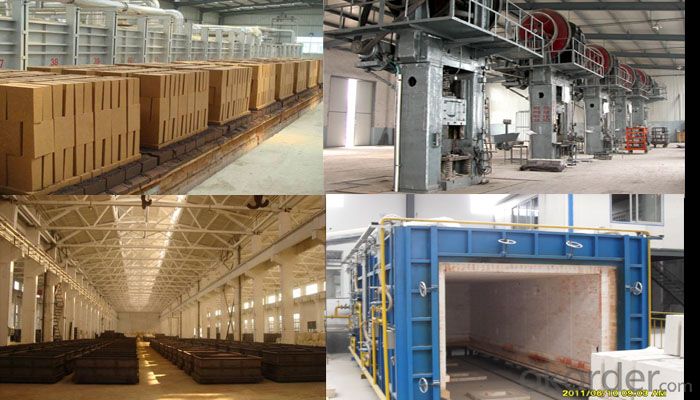
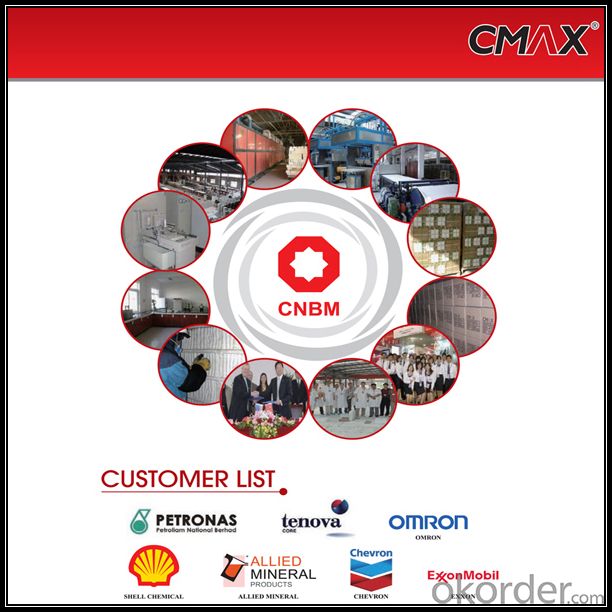
FAQ
1. Which products do you have?
We have all kinds of refractory brick, castable, mortar, cement, ceramic fiber products, etc.
Or you could browse our products to choose what you need.
2. Can you give me a brief introduction of the application of your products?
We are mainly specializing in the refractory materials in iron and steel, cement, glass, ceramics, petrochemical, electric power Industry, etc.
3. If I need your offer, what information do you need?
In order to choose suitable products, it will be appreciated to provide us the information, such us specification, technical data, order quantity, products application etc. If any question, please contact us freely.
- Q: Do insulating fire bricks require special storage conditions?
- Insulating fire bricks do not necessarily require special storage conditions, but it is recommended to store them in a dry, cool, and well-ventilated area. These bricks are made of lightweight materials that are designed to resist high temperatures and insulate heat. However, excessive moisture or exposure to extreme temperatures may affect their performance and durability. It is advisable to protect the bricks from direct sunlight or rain, as prolonged exposure to these elements might cause damage. Additionally, storing the bricks in an organized manner, away from sharp objects or heavy loads, can prevent any potential breakage or deformation. Overall, while special storage conditions may not be mandatory, taking proper precautions can help preserve the quality and longevity of the insulating fire bricks.
- Q: What is the recommended thickness of insulating fire bricks for optimal insulation?
- The thickness of insulating fire bricks recommended for optimal insulation can vary depending on the specific application and desired level of thermal protection. In general, it is commonly recommended to use insulating fire bricks with a thickness ranging from 2.5 to 4 inches (6.35 to 10.16 cm) for efficient insulation. Insulating fire bricks are designed to have low thermal conductivity, which effectively minimizes heat transfer. The insulation properties increase with thicker bricks, as they provide a greater barrier against thermal energy loss or gain. This is especially important in applications where maintaining a stable temperature is crucial, such as in industrial furnaces, kilns, or high-temperature appliances. To ensure optimal insulation performance, it is important to consider the specific requirements of the insulation project and consult with experts or manufacturers. Factors such as the maximum temperature, duration of exposure, and desired energy efficiency should be taken into account when determining the most suitable thickness for the insulating fire bricks.
- Q: Can insulating fire bricks be used for insulation in drying ovens?
- Insulating fire bricks are indeed suitable for insulation in drying ovens. They have been specifically engineered to offer exceptional thermal insulation, which makes them highly suitable for high-temperature applications like drying ovens. Thanks to their low thermal conductivity, these bricks are able to effectively retain heat and prevent heat loss from the oven. Furthermore, they possess a remarkable resistance to high temperatures and can endure the extreme conditions typically present in drying ovens. Moreover, their lightweight design facilitates easy installation and handling. In summary, the use of insulating fire bricks for insulation in drying ovens can enhance energy efficiency, minimize heat loss, and ensure a more consistent and controlled drying process.
- Q: Can insulating fire bricks be used in refractory castings?
- Indeed, refractory castings can incorporate insulating fire bricks. Due to their lightweight nature and exceptional insulation abilities, insulating fire bricks are ideal for tasks that demand thermal insulation. Such tasks include the creation of linings in furnaces, kilns, and other equipment that operates at high temperatures. To achieve thermal insulation and minimize heat loss, insulating fire bricks can be utilized either as a layer or as an element within the refractory casting mixture. Furthermore, their low thermal conductivity aids in reducing energy consumption and sustaining elevated temperatures within the casting.
- Q: Can insulating fire bricks be used in smelting furnaces?
- Yes, insulating fire bricks can be used in smelting furnaces. Insulating fire bricks are specifically designed to withstand high temperatures and provide excellent thermal insulation. They help in reducing heat loss and improving energy efficiency in the smelting process.
- Q: Are insulating fire bricks resistant to spalling?
- Insulating fire bricks exhibit resistance to spalling. These bricks are specially engineered to endure elevated temperatures and thermal shock, rendering them highly immune to spalling. Spalling indicates the fracturing and fracturing of bricks owing to exposure to extreme heat. Composed of superior refractory materials with low thermal conductivity, insulating fire bricks restrict heat transmission and diminish spalling hazards. Moreover, these bricks boast a remarkable melting point, rendering them excellently suited for applications demanding high temperatures. Consequently, insulating fire bricks find widespread application in furnaces, kilns, and other environments characterized by elevated temperatures, where spalling poses a significant concern.
- Q: Are insulating fire bricks resistant to weathering?
- Yes, insulating fire bricks are resistant to weathering.
- Q: Can insulating fire bricks be used in contact with molten metal?
- Yes, insulating fire bricks can be used in contact with molten metal. Insulating fire bricks are designed to withstand high temperatures and are often used in applications involving molten metal, such as in furnaces and kilns. They have excellent thermal insulation properties and are resistant to thermal shock, making them suitable for use in these environments.
- Q: Can insulating fire bricks be used to line industrial boilers?
- Yes, insulating fire bricks can be used to line industrial boilers. Insulating fire bricks are specially designed to have low thermal conductivity, which helps to minimize heat loss and improve energy efficiency in the boiler system. These bricks are made from lightweight materials such as clay and alumina, which have excellent insulation properties. By lining the interior of the boiler with insulating fire bricks, the heat generated by the combustion process can be contained within the boiler, resulting in higher heating efficiency and reduced fuel consumption. Additionally, insulating fire bricks can withstand high temperatures and thermal shocks, making them suitable for the harsh operating conditions often encountered in industrial boilers. Overall, using insulating fire bricks as a lining material in industrial boilers can contribute to improved energy efficiency, reduced operating costs, and increased durability of the boiler system.
- Q: How do insulating fire bricks affect the overall efficiency of a heating system?
- Insulating fire bricks can significantly improve the overall efficiency of a heating system. Their high thermal resistance helps to minimize heat loss and increase heat retention within the system. This means that less energy is required to maintain the desired temperature, resulting in reduced fuel consumption and increased energy efficiency. Additionally, the insulating properties of fire bricks can also help to create a more balanced and consistent heat distribution, ensuring that the heating system operates more efficiently and effectively.
Send your message to us
Standard Size Insulating Fire Bricks
- Loading Port:
- China main port
- Payment Terms:
- TT OR LC
- Min Order Qty:
- 0.01
- Supply Capability:
- 1800 m.t/month
OKorder Service Pledge
OKorder Financial Service
Similar products
Hot products
Hot Searches
Related keywords
